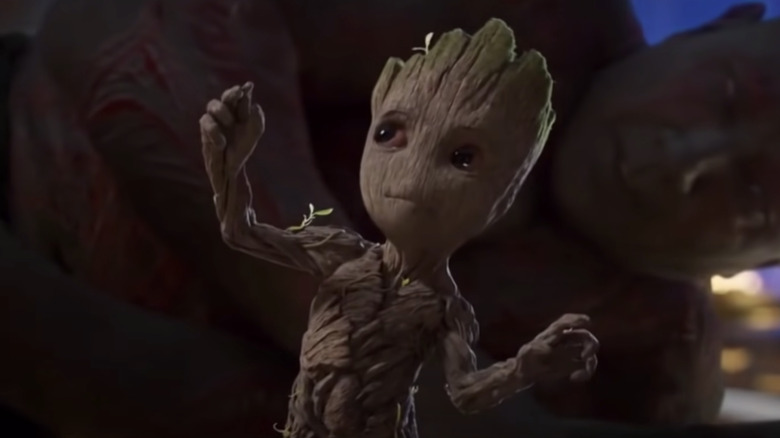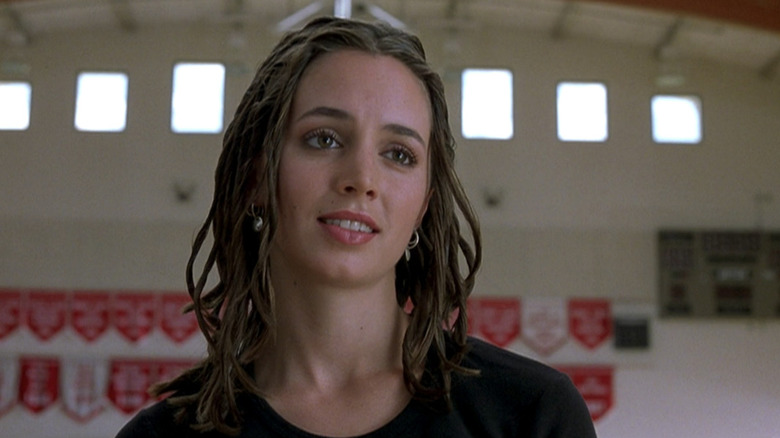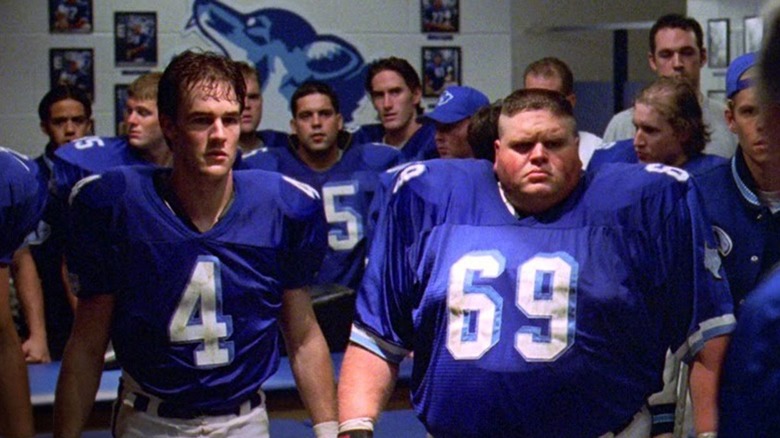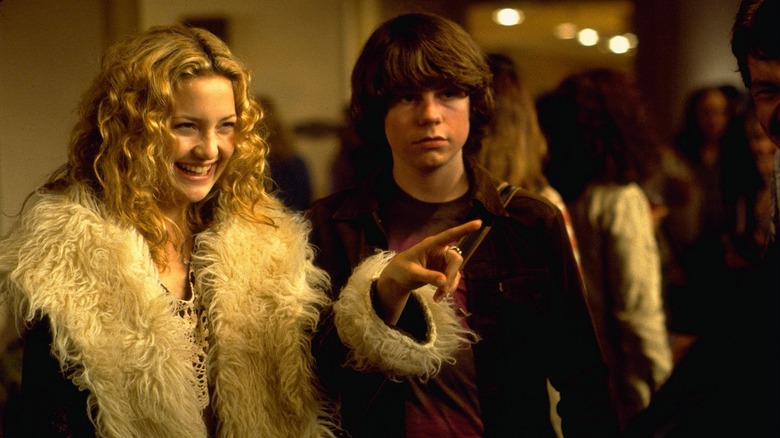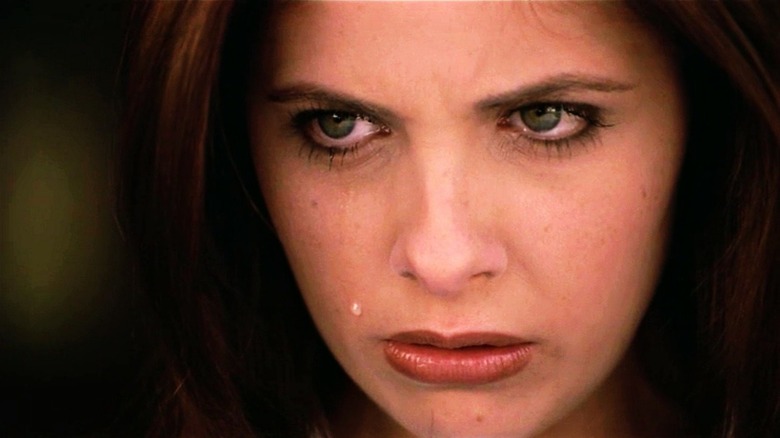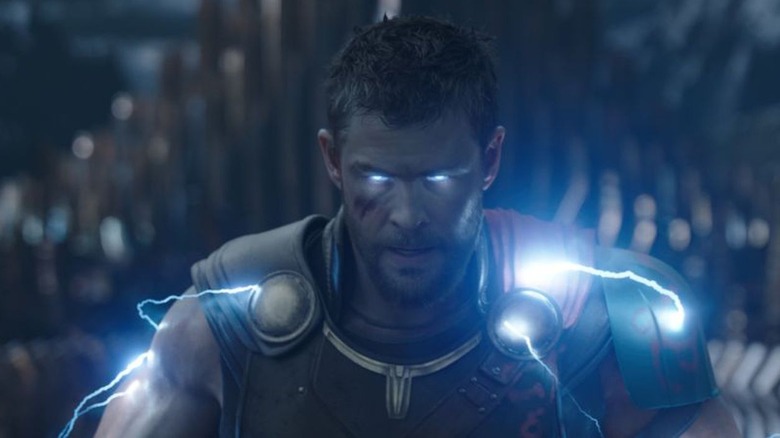Movies That Paid Big Bucks For Needle Drops
Needle drops can truly elevate a scene in a movie to another level. For a lot of films, music can serve as their own character, and as legendary music critic Mark Kermode said in a 1995 essay, "It can create an instant period location, establishing with just a few choice chords, haunting vocal phrases, or distinctive drum beats, an authentically rich milieu from over five decades of social history." Imagine a film like "Guardians of the Galaxy Vol. 2" without "Mr. Blue Sky" by ELO serving as the soundtrack to Baby Groot's adorable dance (which almost didn't happen), or the head-banging scene in "Wayne's World" to a song other than Queen's "Bohemian Rhapsody." In both instances, the needle drop has become synonymous, and thinking about another song playing feels sacrilegious. But in the era of streaming and record-smashing blockbusters, the world of licensing music has gotten a little more complicated than it used to be — and wicked expensive.
Whenever a hit song or any other form of pre-recorded music (yes, including classical pieces) plays in a film or TV show, the use of the song has to be licensed and fees have to be paid. One fee goes to the songwriters, while a second goes to the record company responsible for the recording. All of those slowed-down, brooding covers that play over movie trailers? The original songwriter still gets a cut of the licensing fee, even if they weren't the one playing on the version being used. Usually music supervisors broker the deals to get certain songs, but sometimes, filmmakers will personally reach out to artists to gain their permission. That's the thing: Sometimes there isn't enough money in the world for an artist to sign off on the usage of their music, and it takes some extra convincing. Music licensing is not created equal, and for some films, a huge chunk of the budget is dedicated to kickin' tunes.
The priciest part of Bring It On was licensing 'Cherry Pie' by Warrant
Before Peyton Reed stepped into the MCU as the director of the "Ant-Man" films, he directed quite possibly one of the greatest teen girl movies of all time, "Bring It On." A film about the cut-throat world of competitive cheerleading, "Bring It On" was home to a cornucopia of different songs, as many were cut and mashed to make the routine music. "As If" by Blaque was used, and likely didn't cost a lot considering members Shamari DeVoe, Brandi Williams, and Natina Reed all appeared as members of the East Compton Clovers cheerleading squad led by Gabrielle Union. But one song in particular was responsible for the biggest line-item cost of the entire production.
When the Rancho Carne Toros hold auditions for a new cheerleader, a student shows up and performs a seductive dance number to "Cherry Pie" by Warrant. Unfortunately, the song was not cheap, and the production ended up paying $40,000 for the rights to the song. According to Reed, that amount was the result of a compromise after a negotiation, and he has not revealed how much the initial asking price was. The production ended up shuffling around some music choices in order to afford the track, because after trying the scene with other songs, nothing hit quite like "Cherry Pie." The film uses less than thirty seconds of the song, but when you're licensing music, you pay the same price for five seconds as you would for a whole song. It's why movies like "Can't Buy Me Love" from 1987 uses the titular track by The Beatles during the opening and end credits. If you're gonna dish out the dough, you might as well get your money's worth.
AC/DC is notoriously expensive
Back in 2014, Variety sat down with a group of music supervisors to talk about their process and to disclose the most expensive track they'd ever secured for a project. Emmy-nominated Thomas Golubic has worked on "Breaking Bad," "The Walking Dead," "Grace & Frankie," and plenty of other hit series, but the most he ever spent was securing AC/DC's "Thunderstruck" for a whopping $500,000. "I remember being absolutely horrified when I heard that number," Golubic said. With such a steep price tag, it'd be safe to assume this was the cost for a huge franchise film with tons of marketing behind it like "Iron Man 2," but Golubic paid that price for the mid-budget teen film "Varsity Blues."
Knowing how much it cost for just that one song, it begs the question of how much the music cost for Stephen King's "Maximum Overdrive," as the film is exclusively filled with AC/DC's "Who Made Who" album. Better yet, how much did it cost for the 15 AC/DC tracks featured on "Iron Man 2," a movie that was all but guaranteed to be one of the most profitable films of 2010? It's estimated that the band brought in $1.8 million in publishing royalties alone during 2020, making them one of the highest paid bands in the world.
Almost Famous had double the music budget than most feature films
Cameron Crowe's "Almost Famous" was a critical darling upon release, but didn't see a huge return at the box office. Loosely based on Crowe's lived experiences, "Almost Famous" tells the story of a teenage journalist, played by Patrick Fugit, who follows a rock band on the verge of their big break in the early 1970s. It's largely considered one of the greatest films about music ever made, and with a soundtrack boasting over 50 artists (including Simon & Garfunkel, The Who, Yes, The Beach Boys, Rod Stewart, The Allman Brothers, Lynyrd Skynyrd, Led Zeppelin, Elton John, David Bowie, Cat Stevens, The Stooges, Steely Dan, The Jimi Hendrix Experience, Black Sabbath, Jethro Tull, Raspberries, Deep Purple, and Joni Mitchell, to name a few), it makes sense why the film shelled out $3.5 million in music licensing alone.
Knowing that some artists *cough* Led Zeppelin *cough* are infinitely more expensive to license than, say, Raspberries, between the 53 songs used on the soundtrack and the film, the production averaged spending around $66,000 for each song. While there's been no public confirmation, there's a high likelihood that some of the bigger named bands cut a deal for the licensing because they believed in Crowe's vision and wanted their music to be a part of it. Considering how wonderful "Almost Famous" is, they were all smart to get on board.
Cruel Intentions used 10% of its budget on one song
There's clearly a trend with teen movies spending the big bucks on needle drops, but 1999's "Cruel Intentions" takes the cake. The teenage erotic thriller from Roger Kumble starring Sarah Michelle Gellar, Ryan Phillippe, Selma Blair, and Reese Witherspoon is one of the most memorable films of the 1990s, with the teenage interpretation of "Les Liaisons Dangereuses/Dangerous Liaisons" serving as a formidable awakening for a generation. At the end of the film, as SMG's Kathryn Merteuil's plot falls apart before her very eyes, the song "Bitter Sweet Symphony" by The Verve begins to play. It's an absolute perfect needle drop to close out this sordid tale of upper-class private school sex and tragedy.
There's only one problem: "Bitter Sweet Symphony" features an orchestral cover of the Rolling Stones' song "The Last Time," which meant licensing the song was going to cost Rolling Stones licensing money. In an oral history on the film for Entertainment Weekly, Kumble admitted that he had written the script with the song in mind, because it "just aligned perfectly," not realizing that the song sampled the Rolling Stones. Neal H. Moritz, who produced the film, confessed that nabbing the rights cost close to a million dollars, "which was probably 10 percent of the budget." Apparently, the team tried over 200 songs in its place to try and bring down the cost, but nothing could capture the moment quite like The Verve. "We could not find anything even close to it," he said. "It was well worth it."
If you want Led Zeppelin, prepare to pay a hefty fee
If you thought AC/DC was pricey, strap in and get ready to choke on the price tag for one of Led Zeppelin's songs. For years, the band was hesitant to let anyone license their music in films, with Jack Black famously recording a video in front of a live audience begging them for the rights to use "Immigrant Song" in "School of Rock." They've been known to charge over a million dollars for licensing just a single song, and the group is also really particular in how their songs are used. Ben Affleck told the Los Angeles Times that they had to digitally alter a shot of a Led Zeppelin record in "Argo," so that the character would be correctly putting the record arm down on the correct place on the record for the particular track to play. "Not only did we have to pay for the song, we had to pay for an effects shot."
Taika Waititi knew from the start that he wanted "Immigrant Song" to play in "Thor: Ragnarok," but it famously took the entire production of the film before Zeppelin was willing to sign off on the song's usage. Music supervisor Dave Jordan handled the deal, but the band didn't agree to let them use the song until Marvel sent them the film's completed teaser trailer, hoping that seeing it in action would convince them. The song was clearly perfect, but I doubt it was Waititi or Marvel's ingenuity that were the deciding factor — it was likely the type of cash that only Disney could afford. "I have a feeling if you want to entertain that idea of using their music, you have to have the money," Waititi said. "No negotiations. Offer it to them straight up." While the exact dollar amount has never been made public, Led Zeppelin was wise to let Marvel use their song. In addition to whatever licensing deal they worked out, the popularity of "Thor: Ragnarok" made way for "Immigrant Song" to top the Billboard charts almost fifty years after its initial release, and saw a bananas-as-hell 977 percent increase in sales after the movie dropped. Hammer and bank accounts of the gods, indeed.
